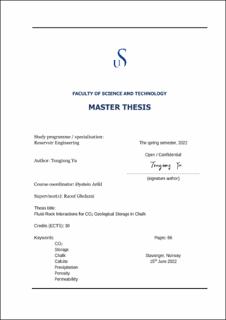| dc.description.abstract | CCS has been recognized as an effective strategy to limit the temperature rise to 1.5 °C by 2050 under the Paris Agreement. As a result, more than 50 CCS pilot or large-scale projects have been commissioned in recent decades, mainly targeting sandstone reservoirs given their favorable petrophysical properties. Although many discussions and practical procedures have been developed, large-scale CO2 storage in carbonates has not yet been implemented. This study attempts to evaluate the feasibility of CO2 storage in chalk formations. The main objective is to evaluate the changes in the storage capacity (porosity) and injectivity (permeability) over time during and after CO2 injection. For this purpose, a series of laboratory tests were carried out on Stevns Klint chalk from Denmark, after exposure to dry/wet CO2 for a period of 37 days under a pressure of 15 MPa and a temperature of 50 °C. The results obtained indicated significant removal of Ca2+ ions from the solution and large precipitation of calcite in the pore structure, which reduced porosity and permeability over time. It was found that chalk may not the best storage site given the rapid reduction in porosity and permeability which can cause complication in well injectivity over time. | |
